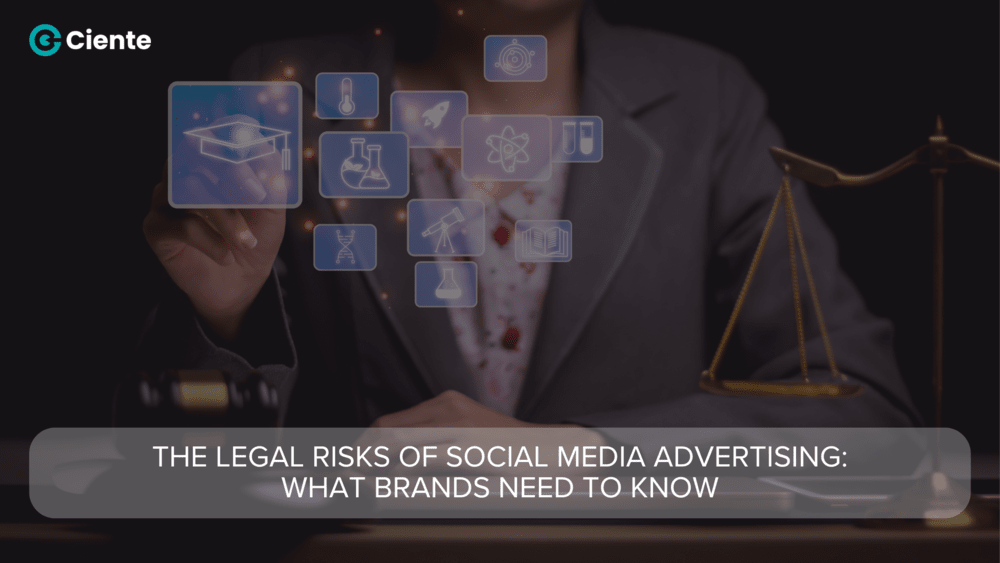The Legal Risks of Social Media Advertising: What Brands Need to Know

Social media has become an indispensable tool for businesses to reach and engage with their target audience. However, the rapid growth of social media platforms has also led to a complex legal landscape that brands must navigate carefully. Failing to comply with relevant laws and regulations can result in significant financial penalties, reputational damage, and even legal action.
Martech startups and other businesses operating in the digital realm must be aware of the legal risks associated with social media advertising. By understanding these risks and taking proactive measures to mitigate them, brands can ensure compliance with the law and protect their business interests.
Key Legal Risks of Social Media Advertising
- False or Misleading Advertising: One of the most common legal issues in social media advertising is the dissemination of false or misleading information. Brands must ensure that all claims made in their ads are accurate and supported by evidence. This includes statements about product features, benefits, performance, and testimonials.
- Intellectual Property Infringement: Brands must be cautious about using copyrighted material, trademarks, or patents in their social media ads without proper authorization. Infringement can lead to legal action and significant financial penalties.
- Privacy and Data Protection: The collection, use, and sharing of personal data through social media platforms are subject to strict privacy and data protection laws. Brands must obtain explicit consent from individuals before collecting their personal information and ensure that it is handled securely and in compliance with applicable regulations.
- Defamation and Libel: Defamatory statements made on social media can harm individuals' reputations and lead to legal claims. Brands must exercise caution when sharing or endorsing user-generated content that may contain defamatory statements.
- Endorsement and Influencer Marketing: Brands often collaborate with influencers to promote their products or services. However, these relationships must be disclosed to consumers to avoid misleading them. Failure to disclose influencer relationships can result in legal action and damage to the brand's reputation.
- Sweepstakes and Contests: Running contests or giveaways on social media can be a great way to engage with the audience. However, these promotions must comply with applicable laws and regulations, including disclosure requirements, eligibility criteria, and prize fulfillment.
- Consumer Protection Laws: Brands must adhere to various consumer protection laws, such as those related to unfair business practices, deceptive advertising, and product safety. These laws may vary from jurisdiction to jurisdiction, so it is essential to understand the specific requirements in your region.
Mitigating Legal Risks
To mitigate the legal risks associated with social media advertising, brands should take the following steps:
- Develop a Social Media Policy: A well-crafted social media policy can provide guidelines for employees and influencers on how to use social media responsibly. The policy should address issues such as content creation, engagement with users, and compliance with legal requirements.
- Conduct Regular Legal Reviews: Regularly review your social media advertising practices to ensure compliance with evolving laws and regulations. Consider consulting with legal counsel to obtain expert advice.
- Monitor Social Media Platforms: Keep track of your brand's social media presence and respond promptly to any issues or concerns raised by users. This can help prevent legal disputes from escalating.
- Educate Employees and Influencers: Provide training to employees and influencers on the legal risks of social media advertising and the importance of adhering to company policies and applicable laws.
- Use Social Media Analytics: Track the performance of your social media campaigns and analyze user engagement to identify any potential legal issues or areas for improvement.
- Consider Legal Insurance: Explore the possibility of obtaining legal insurance coverage to protect your business against potential legal claims arising from social media activities.
Conclusion
The legal landscape of social media advertising is complex and constantly evolving. By understanding the key risks and taking proactive measures to mitigate them, brands can protect their reputation, avoid financial penalties, and ensure compliance with the law. By working closely with legal counsel and implementing effective strategies, businesses can leverage the power of social media while minimizing legal liabilities.
- Art
- Causes
- Crafts
- Dance
- Drinks
- Film
- Fitness
- Food
- Oyunlar
- Gardening
- Health
- Home
- Literature
- Music
- Networking
- Other
- Party
- Religion
- Shopping
- Sports
- Theater
- Wellness


